Introducing Sherry Blok: 2015 TESOL Teacher of the Year
Interviewed by Cydny Black
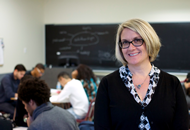 “I’ve always been driven by my desire to learn languages and my interest in multiculturalism,” 2015 TESOL Teacher of the Year Sherry Blok shares on our phone interview last November. It was her experience as a child of immigrants, as a language learner, and her first job working for a Canadian tourism bureau in undergrad that fueled her interest in bridging cultural and language divides through education. These early experiences pushed her to get her MA in second language education at McGill University, which launched her 18-year long career as a university lecturer working with adult ESL learners at Concordia University in Montreal, Quebec.
“I’ve always been driven by my desire to learn languages and my interest in multiculturalism,” 2015 TESOL Teacher of the Year Sherry Blok shares on our phone interview last November. It was her experience as a child of immigrants, as a language learner, and her first job working for a Canadian tourism bureau in undergrad that fueled her interest in bridging cultural and language divides through education. These early experiences pushed her to get her MA in second language education at McGill University, which launched her 18-year long career as a university lecturer working with adult ESL learners at Concordia University in Montreal, Quebec.
What makes Sherry Blok an exceptional teacher is not merely her passion or her unwavering commitment to her students—though each play an integral role in shaping excellence in teaching. What makes her most extraordinary is her investment not just in her classroom but in the entire institutional and community climate. Blok feeds off of the energy of her colleagues and how they all empower one another to be the best ESL professionals possible. “I’m Teacher of the Year because of the wonderful team of teachers and supportive administrators at Concordia University,” she maintains. Moreover, Blok engages in her community and encourages her students to do so through her lesson plans and out-of-class programs.
In the Classroom
According to Blok, environment is key. In her classroom, she uses teacher-designed theme-based units that are Canadian context-specific. The materials are authentic and speak to everyday experiences that her students will encounter. “It makes the lessons much more meaningful and engaging.” Blok is faithful to the communicative method, where students are encouraged to constantly engage through conversations about relevant topics. Most significant to Blok’s teaching style is her commitment to the notion of Global Citizenship. Embedded in her lesson plans, methodology, program development, and all interactions with students is the global citizenship mission to have students examine their own values and attitudes, appreciate similarities and differences, value diversity, and “ultimately give students the opportunity to understand the global context of their lives and develop skills to think critically and make informed decisions while taking an active role in the community.”
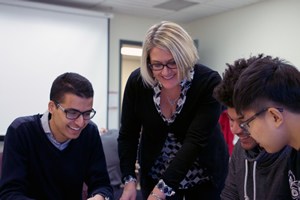
Professional Development
Outside of the classroom, Blok is dedicated to professional development, community outreach, and student mentoring. Of the many programs at Concordia that she spearheaded, she is most proud of her promotion of professional development. “After I received my degree and began working, I knew that I wanted to find a TESOL community of practice—a space where I could engage and grow with the field.” Blok started by organizing “Snack & Shares” at her university. This group of ESL teachers would meet at her school informally, over lunch, to exchange trends in the field and useful classroom tools. Over time, the group began inviting speakers, and more teachers would attend. Today, the program serves as a bridge between the ESL and FLS teachers and the greater Concordia University community.
Around this time, she attended her first TESOL International Convention & English Language Expo in Seattle. It was an experience she describes as life changing.
At the convention that year TESOL had distributed these blue bags. When I walked down the street outside of the expo it was like we’d taken over the city—blue bags were everywhere. It was impressive. I realized the magnitude of people in the field, the diversity of presenters, of backgrounds, of instruction styles. It was so impressive.
Most significant for Blok was that the convention satisfied both her cerebral theoretical interests in the TESOL field and the hands-on practical professional development she was seeking.
In addition to her position as a lecturer, Blok now serves as the professional development coordinator at the Language Institute at Concordia. “For 5 years or so, I was organizing these professional development opportunities pro bono. Now I have a budget,” she says enthusiastically. “I operated on no budget for so long and the programs were successful. It goes to show how generous the academic community is, and it inspires me. It all connects back to my own values about giving back to the community.”
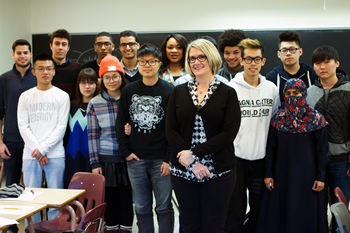
Community Empowerment
Aside from her role as a lecturer and PD coordinator at Concordia, Blok recently launched student outreach programs that include alumni visits. This began with her inviting alumni to come and speak to her students about personal and academic success.
It’s powerful for the students to meet people who have already gone through the same process. They see an example of someone speaking great English from their same home country. These alumni serve as role models. Also, the program is a great way for the alumni to practice their public speaking skills, build their résumés, and strengthen their own professional development. It’s a win-win program.
The program has resonated with her students. After participating in an alumni speaker event, one of Blok’s former students joined the university’s student mentoring program and initiated the bridge with the international ESL students in the Language Institute.
Volunteerism is a practice that Blok promotes in her classroom. For one of her lesson plans, she based a unit on volunteerism. With her colleagues at Concordia, she spearheaded a relationship with the University volunteer center and brought her students to the volunteer fair. “The students got to examine the benefits of professional, academic, and personal benefits of volunteering in addition to practicing their language skills.” Blok notes that for many of her students, volunteering is a foreign concept.
Crossing Borders, Building Bridges
In speaking of her role as a teacher, she says,
Teachers have a great responsibility. My students come from very far away and arrive in a country where they do not have a support system. They need to feel like they belong to a community. For me, it’s not just about being a teacher, but also about being a role model and building network system for my students. Through these community outreach projects, my students get more connected to the university community. Through the professional development programs, I become empowered to better teach them.
Sherry Blok will be attending the 2015 TESOL International Convention and English Language Expo in Toronto, 25–28 March. Her session, “Global Citizenship: Transformative Practices in ELT Excellence,” will discuss ways global citizenship education is applicable in the ESL classroom. For more information on her session or the annual convention, please contact cblack@tesol.org.
________________________________
Cydny Black is the program assistant for public policy and communications at TESOL International Association. In addition to her work for the association, Black is enrolled at American University, where she is working toward an MA in international communications. A DC transplant from her native Madison, Wisconsin, Black enjoys the outdoors, readings, and advocacy work.
TESOL Blogs
Interested in writing a blog for TESOL?
Contact
Tomiko Breland with your idea or for submission details.
Check out the latest TESOL Blogs:
|
What Is Intercultural Communicative Competence?, by Yilin Sun, TESOL President
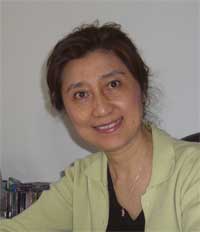 In recent years, several researchers in the ELT field have raised a series of conceptual issues around how we should express our cultures in English (Honna,2005; Byram,2009; Wen, 2013,). As a speaker, should you stick to your own way of thinking? Or should you adapt to the listener’s way of thinking? As a listener, should you impose your own way of thinking on the speaker? Or should you be sensitive to and tolerant of the speaker’s different way of thinking and speaking? Read More. In recent years, several researchers in the ELT field have raised a series of conceptual issues around how we should express our cultures in English (Honna,2005; Byram,2009; Wen, 2013,). As a speaker, should you stick to your own way of thinking? Or should you adapt to the listener’s way of thinking? As a listener, should you impose your own way of thinking on the speaker? Or should you be sensitive to and tolerant of the speaker’s different way of thinking and speaking? Read More.
|
|
eduCanon: For Making Videos Interactive, by Tara Arntsen
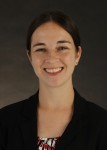 Videos can really be a good addition to any class, especially for students who may be struggling readers or those who are visual learners. Additionally, there are so many to choose from online that you can find videos for every imaginable topic. In the past, I have made traditional paper worksheets for students to complete when watching videos in class or at home, but with eduCanon I can now make videos more interactive by embedding my questions directly into a video (called a bulb on eduCanon). Videos can really be a good addition to any class, especially for students who may be struggling readers or those who are visual learners. Additionally, there are so many to choose from online that you can find videos for every imaginable topic. In the past, I have made traditional paper worksheets for students to complete when watching videos in class or at home, but with eduCanon I can now make videos more interactive by embedding my questions directly into a video (called a bulb on eduCanon).
eduCanon is a great resource for instructors wanting to engage students more fully with videos. Read More. |
|
Teaching ELs to Summarize and Synthesize Texts, by Judie Haynes
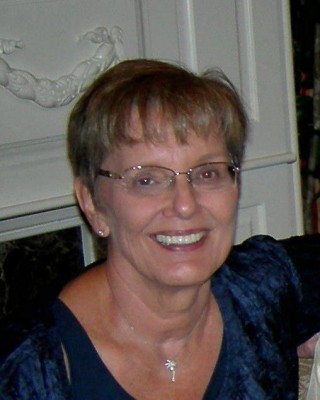 Good readers need to learn to summarize text in order to highlight the important information that they read. In my last blog, I talked about teaching ELs how to determine what is relevant in nonfiction texts. They also need to learn how to pick out what is important in a text when summarizing. Many times children will want to recall every small detail. Good readers need to learn to summarize text in order to highlight the important information that they read. In my last blog, I talked about teaching ELs how to determine what is relevant in nonfiction texts. They also need to learn how to pick out what is important in a text when summarizing. Many times children will want to recall every small detail.
Here are some hints for teaching ELs how to summarize a story: Read More.
|
|
A Roomful of Quotes: A Communicative Activity, by Alexandra Lowe
 I often find that changing what’s on the walls of my classroom changes the energy in the class. Recently, I decided to challenge my intermediate-level adult students to a new speaking activity by posting 24 quotes about taking risks around my classroom. I asked my students to walk around the room, looking at all the quotes. I then asked them to choose three quotes that resonated with them and to write them in their notebooks. I often find that changing what’s on the walls of my classroom changes the energy in the class. Recently, I decided to challenge my intermediate-level adult students to a new speaking activity by posting 24 quotes about taking risks around my classroom. I asked my students to walk around the room, looking at all the quotes. I then asked them to choose three quotes that resonated with them and to write them in their notebooks.
Here are some of the quotes that proved to be especially popular: Read More. |